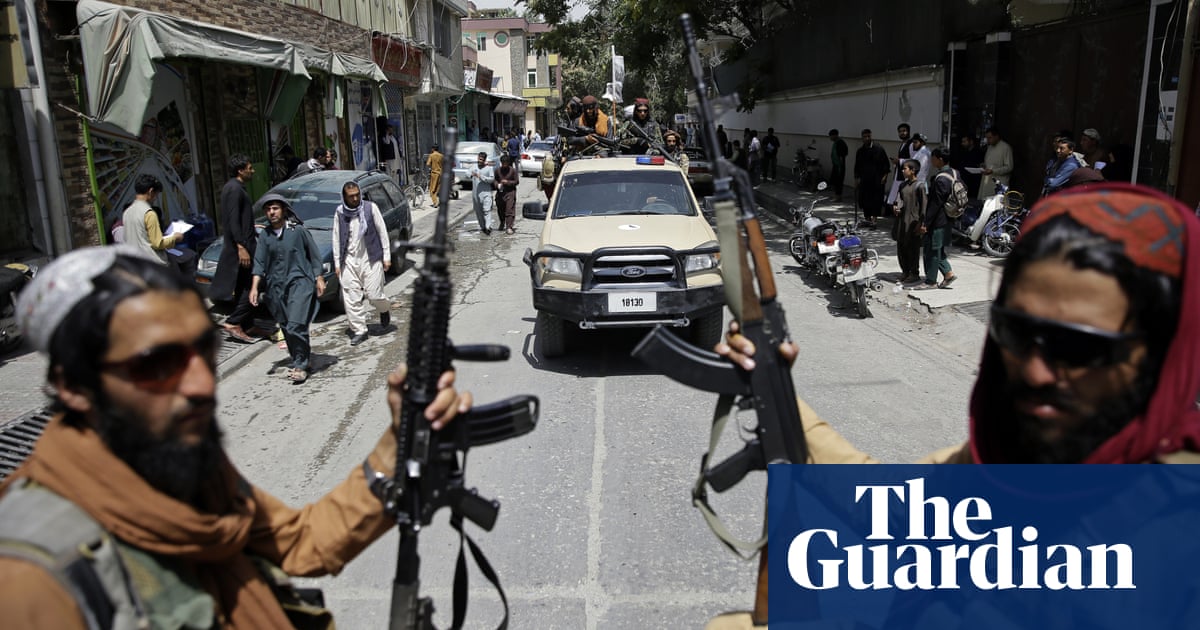
Show caption Taliban fighters patrolling the streets of Kabul. During the previous period of Taliban rule in Afghanistan, the country became a haven for al-Qaida and its leader, Osama bin Laden. Photograph: Rahmat Gul/AP MI5 MI5 chief: Taliban Afghan victory has boosted extremists Ken McCallum says his agency has helped stop six ‘late-stage’ terrorist attacks during pandemic Dan Sabbagh Defence and security editor Fri 10 Sep 2021 11.58 BST Share on Facebook
Share on Twitter
Share via Email
MI5’s chief said the Taliban’s recapture of Afghanistan had given Islamist extremists “a psychological boost” in an interview where he also said the spy agency had helped foil six “late-stage” terrorist attacks during the pandemic.
Ken McCallum, giving his first interview since last month’s fall of Kabul, said Islamist extremists had been “hardened and emboldened” – and would require special vigilance from the domestic spy agency.
Already the majority of current terrorist plots were inspired by external events such as the fall of Afghanistan, McCallum added, and the latest total of six represented an increase of three since March and two since mid-July.
The change of regime in Kabul last month could have a further impact, he said.
“Terrorist threats tend not to change overnight in the sense of, you know, directed plotting or training camps and infrastructure, the sorts of things that al-Qaida enjoyed in Afghanistan at the time of 9/11,” McCallum told BBC Radio 4’s Today programme.
Ken McCallum. Photograph: Yui Mok/PA
But he added: “Overnight, you can have a psychological boost, a morale boost, to extremists already here, or in other countries.” He said a particular focus for his agency would be monitoring individuals contemplating acts of terrorism following the Taliban takeover.
“There is no doubt that recent events in Afghanistan will have hardened and emboldened some of those extremists,” McCallum added.
So-called inspired plots, often undertaken by a single person, were “smaller-scale plots which by their nature are harder to detect”, McCallum said. The “number of plots that we disrupt nowadays are actually higher than the numbers of plots which were coming at us after 9/11” but were of far lower sophistication, he added.
The spy chief also said that 31 “late-stage attack” plots had been disrupted in Great Britain over the last four years, two more than the last total he disclosed , which was in mid-July. Six were halted during the “pandemic period”, an increase of three since an equivalent figure was disclosed in March
During the previous period of Taliban rule in Afghanistan, in the years running up to 2001, the country became a haven for al-Qaida and its leader, Osama bin Laden. But the group has promised the US – as part of a peace agreement – not to allow international terrorism to regrow in the country.
An affiliate of the Islamic State group known as ISKP operates in Afghanistan and is inimical to the Taliban. But while it claimed responsibility for last month’s bomb attack at Kabul airport that killed nearly 200, intelligence agencies believe it does not have the capability to operate internationally.
McCallum, however, warned that the situation could change. “Even if the Taliban is absolutely in good faith about wanting to prevent terrorism being exported from Afghanistan, that will be a difficult task to accomplish. Afghanistan is not an easy country to govern and within which to ensure perfect security.”
While the British government would, overall, “treat the Taliban in the light of its actions”, the intelligence agencies needed to plan for an increase in the Islamist threat. “In my role, responsible for UK national security and counter-terrorism, we have to plan on the basis that more risk progressively may flow our way,” he said.
Intelligence agencies have been criticised for not predicting the speed at which Kabul would fall to the Taliban, although McCallum, whose agency deals with threats in the UK, was not specifically questioned about the topic. Foreign intelligence assessments are the lead responsibility of its sister agency MI6.
The UK has begun to engage directly with the Taliban, with Boris Johnson dispatching an envoy, Sir Simon Gass, the chair of the joint intelligence committee, to meet the group’s political leadership in Qatar. But at the same time key figures have ratcheted up warnings about acting against terrorism.
Overnight, the defence secretary, Ben Wallace, indicated the UK could be prepared to authorise drone strikes in Afghanistan if the Taliban failed to prevent the growth of international terrorist groups in the country.








